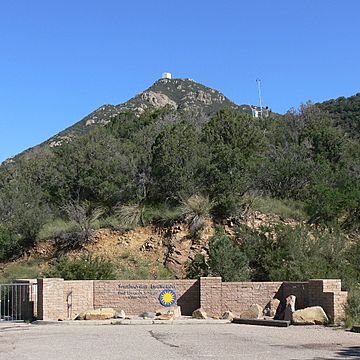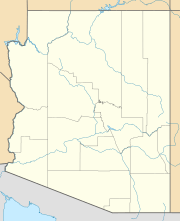Mount Hopkins (Arizona) facts for kids
Quick facts for kids Mount Hopkins |
|
|---|---|

Summit of Mount Hopkins from the entrance to the Fred Lawrence Whipple Observatory that has two locations, one at the bottom of the mountains and the second (this one) located on the slopes of Mount Hopkins.
|
|
| Highest point | |
| Elevation | 8,553 ft (2,607 m) NAVD 88 |
| Prominence | 1,430 ft (436 m) |
| Geography | |
| Location | Santa Cruz County, Arizona, U.S. |
| Parent range | Santa Rita Mountains |
| Topo map | USGS Mount Hopkins |
Mount Hopkins is a tall mountain peak in southern Arizona. It stands about 8,553 feet (2,607 meters) high. This peak is part of the Santa Rita Mountains range. You can find it in Santa Cruz County.
The mountain got its name from Gilbert Hopkins. He was killed nearby in 1865 during a battle. Mount Hopkins is located within the Coronado National Forest. It is also surrounded on three sides by the Mount Wrightson Wilderness.
Exploring Mount Hopkins' Observatories
Mount Hopkins is famous for its important observatories. These places use powerful telescopes to study space.
Fairborn Observatory's Story
In 1979, a scientist named Russell Merle Genet started the Fairborn Observatory. He first set it up in Ohio. Then, in 1985, he moved it to Mount Hopkins, Arizona. Genet worked there until 1993.
He was also the first director of the observatory until 1989. Genet and his team created special robotic telescopes there. This observatory became the first fully automatic robotic observatory in the world. This means the telescopes could work by themselves!
Fred Lawrence Whipple Observatory
The Fred Lawrence Whipple Observatory is also located on Mount Hopkins. Fred Whipple, a professor at Harvard University, was key to building this observatory. He used to work with a small telescope in Massachusetts.
However, the bright city lights there caused "light pollution." This made it hard to see the stars clearly. It limited how useful his telescope could be.
So, Professor Whipple asked an engineer named Tom Hoffman to find a new spot. He needed a place in the U.S. with clear skies and high elevation. It also had to have very little light pollution. After looking at many places, Hoffman found southern Arizona. Its dry air and high mountains were perfect.
With help from The University of Arizona, Hoffman focused on Mount Hopkins. Whipple agreed it was the right place. But then came the big challenge: how to move a huge 8-meter (26-foot) glass mirror and build a telescope on a mountain that had no road!
 | John T. Biggers |
 | Thomas Blackshear |
 | Mark Bradford |
 | Beverly Buchanan |


